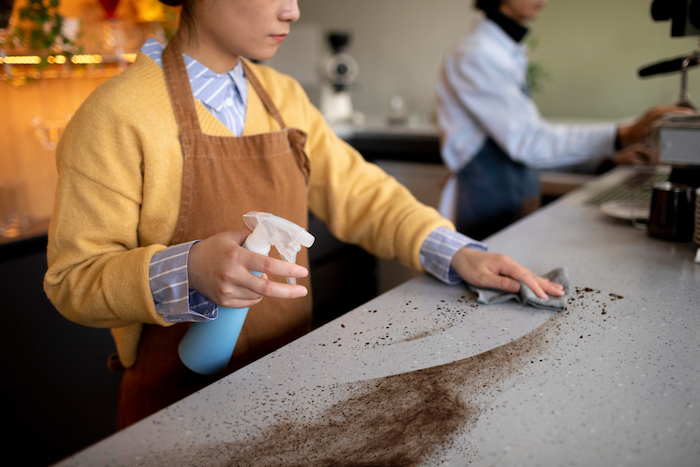Granite countertops are more than just a functional part of your kitchen or bathroom; they are a statement of style, luxury, and durability. However, maintaining their beauty and functionality requires the right care. Learning how to clean granite countertops properly can make all the difference, ensuring their longevity and protecting your investment.
This comprehensive guide will walk you through everything you need to know about cleaning, maintaining, and protecting your granite countertops.
Why Proper Cleaning Matters for Granite Countertops
Granite is a natural stone formed deep within the Earth’s crust, known for its strength and unique patterns. However, its porous nature makes it susceptible to stains and damage if not cleaned properly. Using the wrong cleaning products or neglecting regular care can lead to:
- Dullness: Harsh chemicals can strip the natural shine from your granite.
- Staining: Granite’s pores can absorb liquids, leading to unsightly stains.
- Surface Damage: Abrasive cleaners or tools can scratch and degrade the surface.
By understanding the importance of proper cleaning techniques, you can preserve your countertops’ natural beauty and functionality.
Tools and Materials You’ll Need to Clean Granite Countertops
To clean granite effectively, you’ll need the following items:
- Essential Cleaning Supplies: Mild dish soap or a pH-neutral cleaner: Prevents damage caused by acidic or harsh chemicals.
- Soft microfiber cloths: Ideal for wiping without scratching.
- Warm water: Safe and gentle for daily cleaning.
- Soft sponge: Use a non-abrasive sponge to avoid surface scratches.
- Isopropyl alcohol: Perfect for disinfecting without causing damage.
- Granite-specific cleaner: Adds a polished finish and protects the sealant.
What to Avoid:
- Vinegar, lemon juice, or other acidic cleaners: These can erode the surface.
- Ammonia or bleach: Harsh chemicals that damage the sealant.
- Scouring pads: Abrasive materials can scratch the granite.
Having the right tools on hand makes cleaning quick, efficient, and safe for your countertops.
How to Choose the Right Granite Cleaner for Your Countertops
Choosing the right cleaner can make or break your maintenance routine. With so many products available, here’s how to select one:
Features to Look For
- pH-neutral formula: Prevents damage to the sealant or stone surface.
- Non-abrasive ingredients: Ensures gentle cleaning without scratches.
- Specific for granite: Designed to enhance the natural shine.
DIY Alternatives
- A mix of warm water and dish soap is an excellent daily cleaner.
- For disinfecting, a solution of isopropyl alcohol and water works wonders.
Avoid cleaners labeled as “all-purpose,” as they often contain ingredients harmful to granite.
Daily Cleaning Routine for Granite Countertops
Granite countertops are used frequently, so daily maintenance is crucial to prevent dirt, grime, and stains. Follow these steps:
- Clear the Surface
Before cleaning, remove any items, including appliances, decorations, or utensils. This allows you to clean every inch of the countertop thoroughly.
- Dust or Wipe Debris
Use a dry microfiber cloth to wipe away crumbs, dust, and debris. This step is essential to avoid scratching the surface during the cleaning process.
- Wash with a Gentle Solution
Mix a few drops of mild dish soap with warm water in a bowl or spray bottle. Soak a soft cloth or sponge in the solution, wring it out, and gently wipe the countertop. For stubborn spots, apply light pressure with a non-abrasive sponge.
- Rinse and Dry
After washing, rinse your cloth with clean water and wipe the countertop again to remove any soap residue. Finish by drying the surface with a microfiber cloth to prevent water spots or streaks.
Weekly Deep Cleaning: Keeping Granite Pristine
While daily cleaning removes surface dirt, deep cleaning once a week ensures your countertops remain free of bacteria, grease, and stains.
- Disinfect Safely with Isopropyl Alcohol
Granite countertops, especially in kitchens, can harbor bacteria. Disinfect them with a solution of 50% isopropyl alcohol and 50% water. Spray it over the surface, let it sit for five minutes, and wipe it clean with a microfiber cloth.
- Tackle Tough Stains
If you notice stains, act quickly to prevent them from setting. For oil-based stains, use a mixture of baking soda and water. For water-based stains, mix baking soda with hydrogen peroxide. Apply the paste to the stain, cover it with plastic wrap, and leave it overnight. Gently clean it off the next morning.
- Restore Shine with Granite Cleaner
A granite-specific cleaner not only removes residue but also enhances the stone’s natural shine. Follow the instructions on the cleaner for best results.
Common Mistakes to Avoid When Cleaning Granite
Granite countertops are durable but not indestructible. Avoid these common cleaning mistakes to protect your investment:
- Using abrasive tools: Scrub brushes and scouring pads can scratch the surface.
- Applying acidic cleaners: Even natural options like vinegar can damage the sealant and erode the stone.
- Skipping the drying step: Water spots can form and dull the surface if left to air-dry.
- Using too much cleaner: Excessive product use can leave a sticky residue.
Being mindful of these mistakes can prevent costly repairs or replacements.
How to Safely Remove Stubborn Stains from Granite Countertops
Granite countertops can be prone to stains from everyday items like oils, juices, and water. Addressing stains promptly and correctly ensures they don’t become permanent. Here’s how:
Different Types of Stains
- Oil-Based Stains: Caused by cooking oils, butter, or grease, these stains can darken granite.
- Water-Based Stains: Commonly from coffee, tea, or wine, they can leave visible rings or discoloration.
- Biological Stains: Mold or mildew in damp areas can discolor granite, especially in bathrooms.
Step-by-Step Stain Removal Techniques
- Identify the Stain Type: Understanding the cause helps determine the right cleaning approach.
- Create a Paste: Mix baking soda with water for oil stains or hydrogen peroxide for water-based stains.
- Apply and Cover: Spread the paste on the stain and cover it with plastic wrap. Let it sit overnight.
- Wipe Clean: Use a damp microfiber cloth to remove the paste and clean the surface.
Common Mistakes to Avoid
- Scrubbing too hard can damage the sealant.
- Using acidic or abrasive cleaners may worsen the stain or etch the surface.
Best Practices for Cleaning Granite Countertops in Bathrooms
Bathroom granite countertops face unique challenges like soap scum, hard water deposits, and humidity. Regular cleaning tailored to bathroom needs can keep them pristine.
Challenges Specific to Bathroom Granite
- Soap Scum: Leaves a filmy residue that dulls the shine.
- Water Spots: Hard water can create mineral deposits that are tough to remove.
- Humidity: Prolonged moisture exposure may affect the sealant or promote mold growth.
Recommended Cleaning Products and Tools
- Mild Dish Soap: Effective for daily cleaning without leaving residue.
- Vinegar-Free Glass Cleaner: For water spots, choose a granite-safe product.
- Microfiber Cloths: Gentle and absorbent, ideal for drying and polishing.
Preventive Tips to Avoid Moisture Damage
- Use a squeegee to remove excess water after use.
- Avoid leaving toiletries directly on the surface; use trays to catch spills.
- Ensure proper ventilation to minimize humidity and prevent mold.
Sealing Granite Countertops: Why and How
Granite is a porous material, meaning it can absorb liquids and stains without proper sealing. Sealing creates a protective barrier, preserving the stone’s beauty.
How to Test if Your Granite Needs Sealing
Perform a simple water test:
- Pour a few drops of water onto the surface.
- If the water beads up, the seal is intact.
- If it absorbs into the stone within a few minutes, it’s time to reseal.
How to Seal Granite Countertops
- Clean the Surface: Ensure the countertop is free of debris and stains.
- Apply the Sealant: Use a granite-specific sealant and follow the product instructions.
- Buff the Surface: After applying, buff the countertop with a dry microfiber cloth for a smooth finish.
Repeat this process every 1-2 years for optimal protection.
Protecting Granite Countertops from Damage
Proactive care helps prevent wear and tear. Here are some tips to protect your granite:
Use Coasters and Trivets
Place coasters under glasses, especially those containing acidic drinks like juice or wine. Trivets protect against heat damage from hot pans or dishes.
Avoid Direct Cutting
Always use a cutting board. While granite is scratch-resistant, sharp knives can leave marks over time.
Clean Up Spills Immediately
Granite can absorb liquids quickly, leading to stains. Wipe up spills as soon as they occur, especially those involving oil, wine, or acidic substances.
Maintain the Elegance of Granite Countertops
Granite countertops are an excellent investment, combining functionality with aesthetic appeal. With proper cleaning, regular maintenance, and protective measures, you can ensure they remain as beautiful as the day they were installed. Take the time to care for your countertops today, and enjoy their timeless charm for years to come.
FAQ
Can I use vinegar or lemon juice to clean granite countertops?
No, vinegar and lemon juice are acidic and can damage the sealant, causing dullness or etching on the granite surface.
How often should I reseal my granite countertops?
Granite countertops typically require resealing every 1-2 years. Perform the water test to determine if your seal is still effective.
What’s the best way to remove stains from granite countertops?
For oil-based stains, use a baking soda paste. For water-based stains, mix baking soda with hydrogen peroxide. Apply the paste, cover it with plastic wrap, and leave it overnight.
Are granite countertops safe for food preparation?
Yes, granite countertops are safe for food preparation, especially if regularly cleaned and disinfected. Avoid placing food directly on the surface; use cutting boards for hygiene.
Read More: Design and decor on homethreads .org







